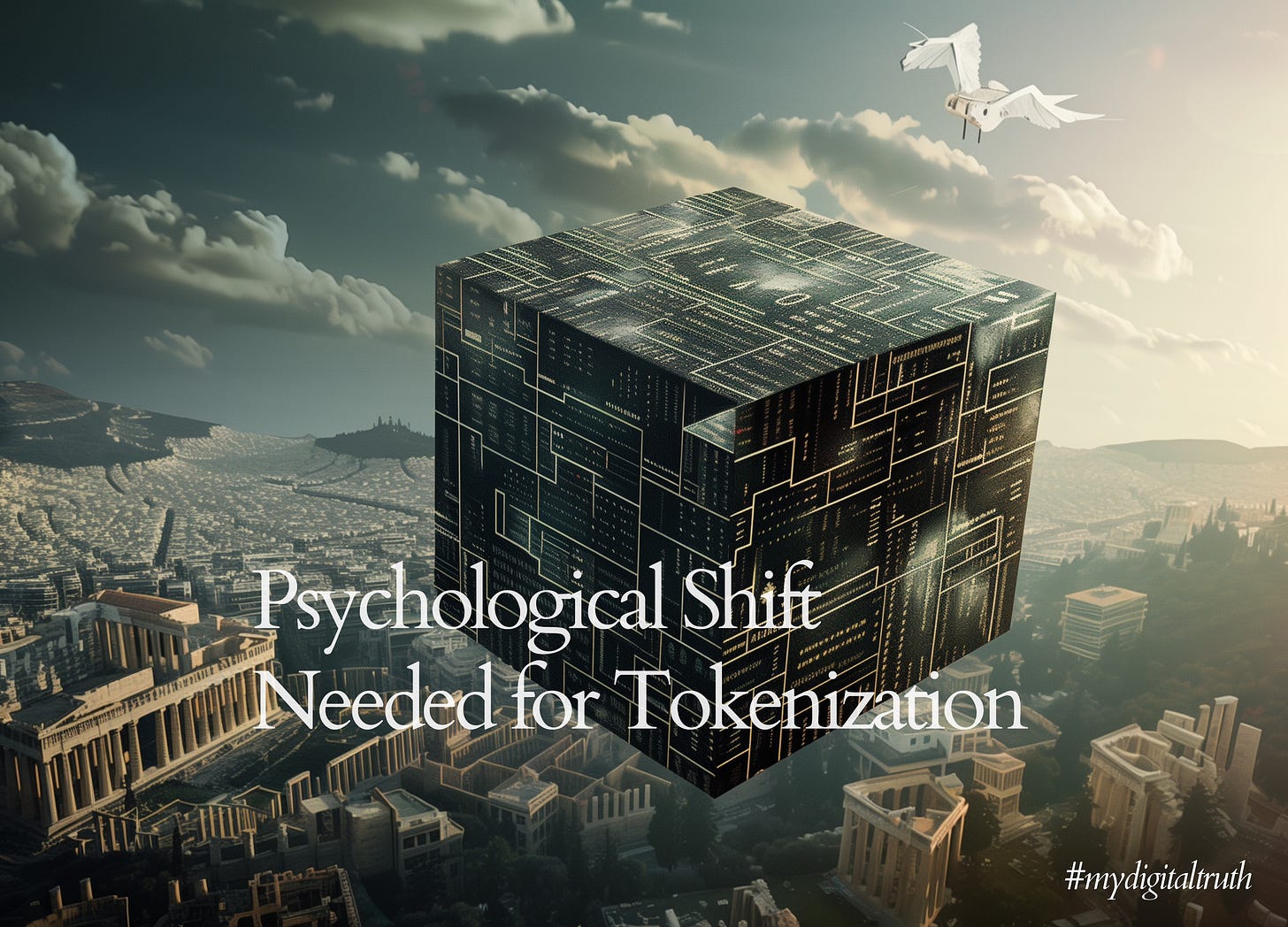The Psychological Shift Needed for Tokenization’s Success in Blockchain
The required "state change" in mindset, not just technology, will determine the future success of blockchain tokenization.
This article picks up where I left off, exploring the important aspects that have so far held the market back from fully exploiting the opportunities of tokenization. It’s been a lingering issue—everyone seems to agree that tokenization could transform markets, but just not yet.
So, you might ask, when will it happen? That’s the one question I don’t have a concrete answer for—at least, not beyond speculation. However, I can speak to the preconditions that need to be in place for it to happen. These preconditions are what is called ‘notwendige’ (necessary), but not ‘hinreichende Bedingung’ (sufficient conditions).
The concept of ‘necessary but not sufficient conditions’ isn’t new. In fact, it was originally discussed by Aristotle in ancient Greek philosophy, where he explored the relationship between causes and effects, laying the groundwork for formal logic developments in the 19th and 20th centuries. It’s become one of the defining characteristics of my blockchain rodeo (more on why I call it a rodeo later). Many of my breakthrough moments in understanding blockchain have been made possible only with a solid dose of Greek philosophy, which has forced me to rethink much of the technical and financial market know-how I’ve accumulated over the years. The validity of this observation continues to surprise me.
And here’s a side note for philosophy departments at prestigious universities: this might be your ticket into the lucrative management training market. I’m just saying.
To wrap up this thought, even with blockchain offering an alternative system, we still need a catalyst for change. What exactly that is—the factor that pushes everyone to embrace it (the sufficient condition)—remains beyond the reach of my current forecasting tools.
OMFIF tweeted—no, sorry, that term is now only for those still behind the curve—after the rebrand to X, they posted the following:
"92% of market participants in our Digital Assets 2024 report believe #tokenisation will significantly impact financial markets. Most (52%) expect this transformation in 6-10 years, with all agreeing it's at least three years away."
For those wondering, OMFIF stands for Official Monetary and Financial Institutions Forum, although they seem to go out of their way not to mention that too often. Instead, they prefer to describe themselves as an "independent think tank for central banking, economic policy, and public investment." Some of their ideas, though, feel like they’re from another planet. Take this one, for example:
"Central banks representing $78tn of GDP, 93% of the world economy."
Honestly, I had no idea central banks represented such massive slices of global activity. I guess next time I'm in Paris, I should consider getting a haircut from the Banque de France, or perhaps see what kind of cars the Deutsche Bundesbank sells. Perhaps they mean their membership includes central banks of economies that add up to 93%. I'm really not sure.
But back to tokenization. The truth is, these statements do not represent projections and lack the qualitative aspects of economic predictions. It’s one thing to throw around big numbers and timelines (this a general comment not related to OMFIF); it’s another to provide a thoughtful analysis of the underlying conditions required to make these transformations a reality. Statements like "tokenization will be huge in a few years" are better described as "maybe" at best. We’ve heard this before—a lot.
My thesis for a while has been that a key issue with blockchain adoption relates to a lack of understanding of how blockchain drives efficiency as a deterministic system and what is required to operate as one. So how does this differ from current market structures, which are not deterministic, and why does this distinction matter?
The relevant property of blockchain is its deterministic processing capability, which materializes under specific conditions, with consensus mechanisms and other features enabling this. Deterministic processing refers to a computational system where the output is entirely predictable and consistent, given the same input and initial conditions. In deterministic systems, for any given set of inputs, the outcome will always be the same.
For example, if I want to send 100 USD from A to B and provide a valid instruction (the set of inputs), this transfer will always occur as expected.
Now, you might ask: Is mainframe operating software like z/OS or z/VM written in a way that makes it indeterministic or non-deterministic compared to Ethereum software? I’d say not in an absolute sense. (Yes, "it depends" is really one of my favourite phrases!) It depends on what we mean by it.
Solidity, the software Ethereum is primarily written in, is designed to be computationally deterministic. Smart contracts run predictably across all nodes in the network. If a smart contract is deployed and executed on multiple nodes, each node must reach the same result. The rules governing this process need to be precise and consistent to avoid ambiguity. However, even though Solidity is deterministic to the extent this is possible, writing secure and bug-free smart contracts remains complex and can lead to misinterpretations or unintended outcomes.
That said, the arrangement in Ethereum is deterministic in several key aspects. The Ethereum Yellow Paper explains this quite well:
"The execution of a valid transaction begins with an irrevocable change made to the state: the nonce of the account of the sender [...] is incremented by one, and the balance is reduced by part of the up-front cost [...] there can be no invalid transactions from this point."
So, what does this mean? It’s a system where, once certain conditions are met, the user can no longer unilaterally change or input new instructions. Ethereum’s software enforces this kind of determinism through its consensus mechanisms, ensuring that the state remains consistent and unchangeable once a transaction is validated.
Today, inefficiency arises because IT systems are imperfect and cannot account for every possible scenario that might influence people's decision-making. In other words, there's an element of randomness in decision-making in current systems, leading to non-deterministic outcomes.
For example, if IT makes a mistake—let’s say it accidentally deletes a user profile—it can’t simply recreate that profile on its own. It needs instructions from the user, even though the user wasn’t responsible for the issue. If the IT system created data on its own without user input, it would compromise the integrity of the system.
On the other hand, Operations (Ops) teams have more flexibility. If they make a mistake, they can often fix it without user input by relying on established procedures, like the four-eye principle. The four-eye principle is a procedure often used in operations and auditing to ensure accountability. It requires that two people must review and approve an action before it can be executed, thereby reducing the risk of errors or fraud. They might agree to adjust a discrepancy, for instance, telling a client their balance should be 100 when the system shows only 50, and then reconciling the issue with an off-system control.
Blockchain eliminates this entire process—both the cost and the flexibility it offers—and replaces it with data standards and data distribution rules. The critical point is that participants cannot deviate from these rules once consensus is reached. However, here’s the issue: while this works for crypto, it doesn’t work for the tokenization of financial instruments, because regulatory or legal requirements prevent banks from offering services without the ability to manage performance and intervene when necessary.
In my mind, this means tokenization, as it’s currently conceived, cannot work. Tokenized assets can certainly be created, but the current setup is in no way better than what we already have. However, I think there’s a way to square this circle—though that’s a topic for another article. :)
Here’s the thing: Both IBM mainframes and Bitcoin are digital systems, but the difference isn’t just about the tech—decentralization, blah blah. In fact, the Ethereum Yellow Paper agrees with me on this point when commenting on Ripple:
"It has demonstrated that high efficiency gains can be made if the decentralisation premise is discarded."
This means that a deterministic computational framework doesn’t necessarily require decentralization. However, decentralization acts as a powerful deterrent against compromising these deterministic qualities.
With centralized systems like mainframes, users have a lot of flexibility. But in a decentralized system like Bitcoin, users are suddenly constrained. And here’s the kicker: Blockchain’s innovation isn’t really a technological one—it’s more of a psychological innovation. It essentially "tricks" the user into accepting constraints on their ability to interfere by saying, "Hey, how else could we coordinate among untrusted agents?"
If you’re thinking, "Who cares about this distinction?"—here’s why it matters: If our terminology doesn’t reflect these nuances (and right now it does a poor job), the debate around blockchain lacks a real understanding of its business impact. Only when we clearly see how blockchain drives efficiency—as a deterministic system that removes the ability of users to deviate from the outcome—can we say something useful about where and how this setup is feasible.
If we want to make tokenization work for financial instruments, we either need to pull off this psychological trick on all decision-makers at scale—something like, "Hey, how else could we create structural cost savings benefiting consumers?"—or we need to ask a better question: Which financial activities allow us to create trustful data objects—financial data or user instructions whose correctness we can verify digitally?
Only with data that meets this requirement can tokenization deliver superior outcomes over the existing institutional arrangements.
PS: Regarding the whole rodeo thing, I should mention that I’m currently deeply invested in making a cowboy musical (yes, really). If you're curious, you can listen to my progress so far here, and it’s starting to influence how I think about everything—including blockchain. So, on that note, giddy up! We’re in for quite the ride.






